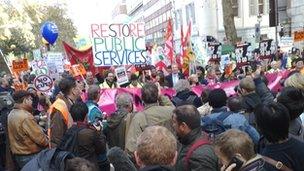UK schools disrupted by pension strike
- Published
Schools closed in pensions strike. The BBC's Jon Kay reports.
Strike disruption has hit thousands of schools across the country, as public sector workers walked out over pension reforms.
Across the UK, millions of pupils missed classes as about 18,342 schools - 67.5% - were closed.
In England, the Department for Education (DfE) said 13,349 out of 21,476 state schools - 62% - were shut.
Schools Minister Nick Gibb said it was "irresponsible to strike while negotiations are ongoing".
The DfE said 14% (2,951) of schools were partially open and 16% (3,351) were fully open. The status of the remaining 8% was unknown. The figures on closures relate to state-funded schools in England, including academies and free schools.
In Wales, more than 1,500 out of 1,776 schools closed their doors.
In Scotland, figures from the local authority body Cosla suggest just 33 of the 2,700 state schools were open.
In Northern Ireland, about two-thirds of the 1,200 schools closed their doors.

Many parents were told last week that schools were going to be closed for Wednesday's strike
Pension cuts
University and college students faced cancelled lectures as the UCU lecturers' union joined the dispute.
School and university staff are angered at being asked to work longer and pay more for reduced pension returns.
But the government says that rising life expectancy means that the current pension scheme is unaffordable - and that the revised arrangements will still represent a good deal.
Education Secretary Michael Gove said teachers lived longer than many other workers and it was "only fair" that they contributed more to their pensions.
Mr Gove said he would be meeting union bosses on Thursday as part of ongoing talks about changes to the TPS (teacher pension scheme).
But Mary Bousted, general secretary of the ATL, told a protest rally in Manchester: "We are not here to say that there must be no changes.
"We are here to say to the government: stop treating us with contempt. If you need to change public sector pensions because people are living longer, show us your sums. Make your case."
UCU general secretary Sally Hunt said: "Our members are unlikely militants and would much rather be in the classroom than on the picket line.
"However, they are not prepared to sit back while their living standards are attacked and will fight to protect their pensions. They want proper negotiations to secure a resolution to the dispute, not more government spin."
NUT leader Christine Blower rejected claims that teachers' pensions were unaffordable.
"This is a government that is determined to press ahead with reform regardless of need," she said.
Staff in the NUT, NASUWT and ATL backed the strike - and, for the first time in its 114-year history, the National Association of Head Teachers (NAHT) took strike action.
The UK-wide strike was supported by AHDS and EIS in Scotland, INTO in Northern Ireland and UCAC in Wales.
The disputed pension changes apply to the scheme for teachers in England and Wales - but staff in Scotland and Northern Ireland are warning that the proposed shake-up could be applied to their schemes too.
'Benefits no-one'
Many parents were told last week that schools were going to be closed for Wednesday's strike.
Local authorities put lists of closed schools on their websites.
Mr Gibb said: "Strikes benefit no-one - they will disrupt pupils' education, hugely inconvenience parents, and damage teachers' reputation.
"It's irresponsible to strike while negotiations are ongoing. Many parents will struggle to understand why schools are closed when the pension deal on the table means that teachers will still be better rewarded than the vast majority of workers in the private sector.
"Reforms to public sector pensions are essential - the status quo is not an option. The cost to the taxpayer of teacher pensions is already forecast to double from £5bn in 2006 to £10bn in 2016, and will carry on rising rapidly as life expectancy continues to improve.
"The Teachers' Pension Scheme will remain one of the best available - but it's going to be fairer for the taxpayer by keeping costs under control."
- Published29 November 2011
- Published10 September 2012
- Published9 November 2011
- Published28 November 2011